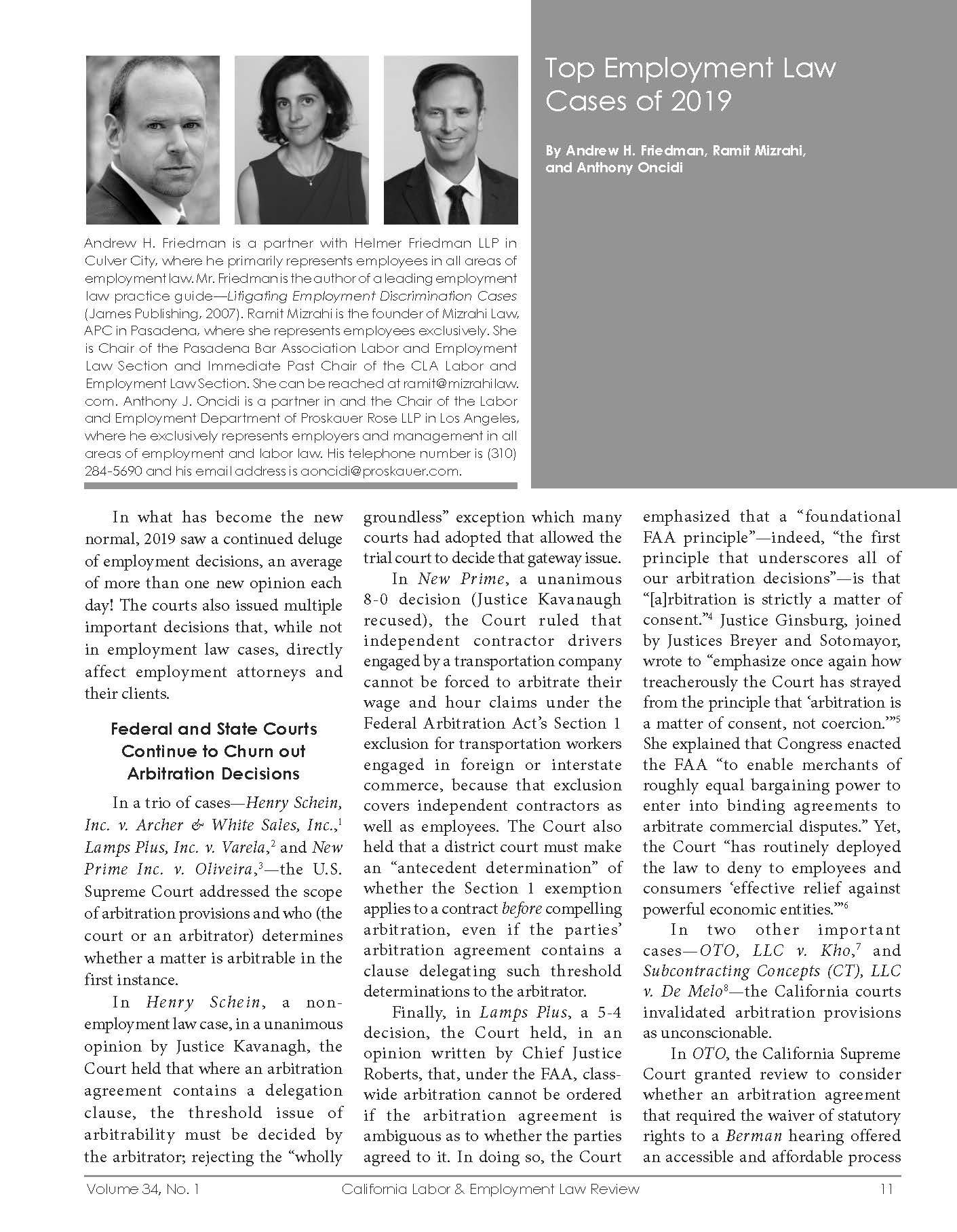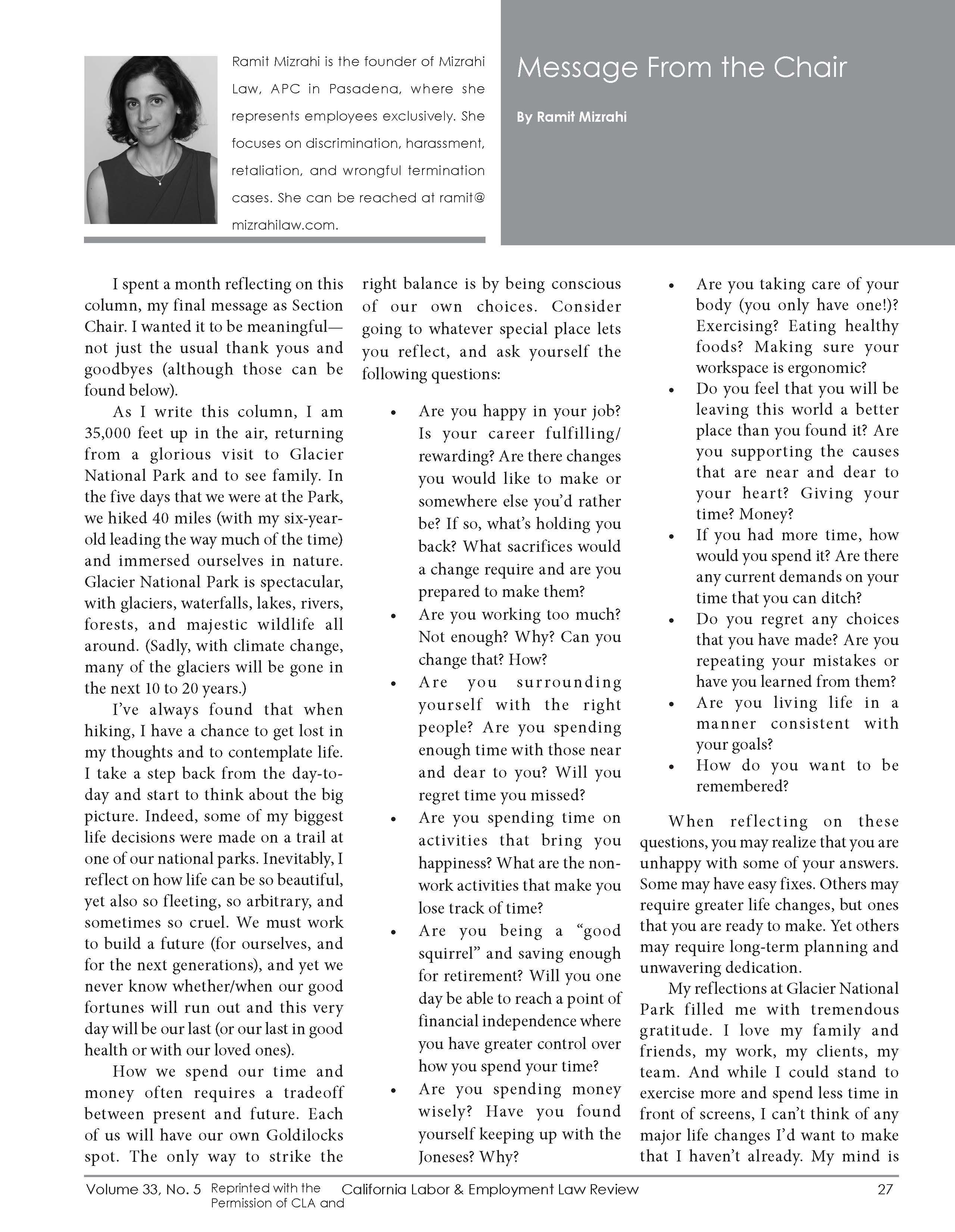-

Ramit Mizrahi has been recognized in U.S News & World Report’s 2021 Edition of The Best Lawyers in America© for her work in employment law representing individuals.
Ms. Mizrahi has also been selected to the 2021 Southern California Super Lawyers® list, again for her work in employment law representing individuals.
Both honors reflect peer recognition of excellence in practice.
This marks the ninth year that Ms. Mizrahi has been recognized by Super Lawyers®, including having previously been distinguished as being among the top 100 Rising Stars and top 50 Rising Stars women for three consecutive years.
Ms. Mizrahi and the Mizrahi Law team remain committed to serving as tenacious advocates for the firm’s clients while working to build collegiality and community in the legal profession.
-

With many businesses closing or shifting to virtual work due to the novel coronavirus pandemic, it can be confusing as a worker to understand what the laws are surrounding your rights and benefits as an employee. Below is a summary of protections and wage-replacement options available to employees in various scenarios related to coronavirus.
-
The January 2020 issue of the California Lawyers Association’s Labor & Employment Law Review features an article authored by Ramit Mizrahi, Andrew Friedman, and Tony Oncidi.
The article—”The Top Employment Cases of 2019″—highlights the most important California state and federal employment cases from last year. Click on the below image to read the article in full.
-

On February 6, 2020, Ramit Mizrahi will be speaking about leave law rights at the California Lawyers Association’s Employment Law 101—Fundamentals for the New Employment Practitioner conference.
Here are the details:
Leaves of Absence—Review of All Leaves and Special Focus on FMLA/CFRA/PDL
Description: California’s leave laws are among the most difficult for employers to comply with and manage. In this module, panelists will discuss the Family Medical Leave Act, the
California Family Rights Act, Pregnancy Disability Leave, and various other leaves impacting California employers. Special consideration will be given to the interplay of the various leaves and the potential pitfalls.Date and time: February 6, 2020, 10:30 a.m. – 12 p.m.
Location: St. Anne’s Conference Center, 155 N. Occidental Blvd., Los Angeles, CA 90026
To register, click here.
-

The federal minimum wage has remained at $7.25 per hour for over a decade–not enough to keep a family of two above the federal poverty line. In an effort to keep people out of poverty, twenty-nine states and the District of Columbia have set their own minimum wage, as have numerous cities and counties. Here in California, we are moving toward a $15 per hour minimum wage for all workers by 2023; Los Angeles will reach a $15 per hour minimum wage for all workers by July 2021. Details about the Los Angeles and California minimum wages can be found in this post.
Today, the Washington Post reported on powerful new research published in the Journal of Epidemology & Community Health, which found that a $1 increase in the minimum wages was linked to a 3.4–5.9% decrease in the suicide rate among adults with a high school education or less. The largest effects were found when unemployment rates were high.
In the United States, suicide accounts for approximately 19% of deaths in adults ages 18 to 24 and 11% of deaths in adults ages 25 to 44. Financial stressors are often a factor. For example, the report cited research that “an estimated 1.7% of unemployed US adults attempted suicide in 2017, compared with 0.4% of those working full-time and 0.7% for those working part-time.”
The report estimates that, between 2009 and 2015, 13,800 suicides could have been prevented among those ages 18–64 years with a high school education or less given an increase in the minimum wage equivalent to $1 above prevailing levels; a $2 increase could have prevented 25,900 suicides.
I have written many times about the importance of raising the minimum wage and creating a social safety net for those in need (for example, here, here, and here). Indeed, my master’s thesis was about single mothers, poverty, and the minimum wage. This new research shows just how important it is that we ensure that workers can make a living wage to support themselves and their families.
-
31 Dec '19

We at Mizrahi Law wish you a Happy New Year!
We are very much looking forward to the new year. 2020 stands to be a terrific year for California employees, with some exciting new employment laws going into effect on January 1!
In addition, the State minimum wage increases on January 1 to $13 per hour for large employers (26 or more employees) and $12 per hour for small employers (25 or fewer employees). The City of Los Angeles minimum wage, currently set at $14.25 per hour for large employers and $13.25 for small employers, will increase to $15 per hour and $14.25 per hour, respectively, on July 1, 2020.
-

On October 28, 2019, Motherboard magazine published an article about a particularly egregious case of pregnancy discrimination. The article, titled “Engineer Says Software Firm Cut Her Maternity Leave Short After Her Baby Died,” interviewed Ramit Mizrahi as a subject matter expert on pregnancy discrimination in the tech field. Ramit explained the problem as follows:
“Pregnancy discrimination is a big issue within Silicon Valley. . . Managers start thinking to themselves, ‘If this person is going to be out for four to six months, how are we going to make do? How are we going to function?’ And, unfortunately, this sometimes leads to them denying the pregnant employee opportunities, taking away her job duties, even replacing her or eliminating her role because she took time off. All of these things are illegal.”
“If a company was planning to give someone a promotion, and then finds out that the person is pregnant, they still have to give them that promotion,” she said. “They can’t just say, ‘This isn’t convenient for us.’ But situations do play out this way, and pregnant women are denied opportunities.”
She also explained how Silicon Valley’s gender imbalance and the fact that employees tend to skew younger both contribute to discrimination against pregnant employees/mothers and those who take protected job leaves.
The article can be found here.
-
13 Oct '19

2019 has turned out to be a bumper year for employment legislation. The continued influence of the #MeToo movement can be seen in the number of bills meant to protect employees who have suffered harassment, discrimination, and retaliation. The California Legislature also targeted arbitration abuse, worker misclassification, and other wage and hour law violations. Below, we cover the top employment laws that were signed into law or vetoed this legislative session.
1. Bills Signed Into Law
AB 5 — Dynamex codification; independent contractors
- Codifies the Dynamex Operations West, Inc. v. Superior Court of Los Angeles (2018) 4 Cal.5th 903 “ABC” test to determine whether a worker is an independent contractor or employee, with specified statutory exemptions. Under this test, an employer seeking to classify a worker as an independent contractor bears the burden of establishing:
(A) that the worker is free from the control and direction of the hiring entity in connection with the performance of the work, both under the contract for the performance of the work and in fact, (B) that the worker performs work that is outside the usual course of the hiring entity’s business, and (C) that the worker is customarily engaged in an independently established trade, occupation, or business. . . .
- Applicable retroactively to all claims under Labor Code related to Wage Orders; prospectively to all other Labor Code claims. Applicable prospectively with respect to unemployment insurance.
- Contains numerous statutory exemptions, which apply retroactively. In these circumstances, apply the test laid out in S. G. Borello & Sons, Inc. v. Department of Industrial Relations (1989) 48 Cal.3d 341.
- Prohibits employees from reclassifying existing employees as independent contractors.
More on AB 5 can be found in this blog post.
AB 9 — Increases Time to File Employment Discrimination Claim
- Gives employees more time to bring employment discrimination claims (including harassment and retaliation claims) by extending the deadline to file a verified complaint with DFEH for employment discrimination claims from one to three years.
- Date of verified complaint relates back to filing of intake form with the DFEH.
- Codifies the Dynamex Operations West, Inc. v. Superior Court of Los Angeles (2018) 4 Cal.5th 903 “ABC” test to determine whether a worker is an independent contractor or employee, with specified statutory exemptions. Under this test, an employer seeking to classify a worker as an independent contractor bears the burden of establishing:
-

Update 10/10/2019: Governor Newsom signed SB 142 into law today.
On September 11, 2019, the California Legislature passed Senate Bill 142 (“SB 142”), which would significantly expand lactation accommodations and protections for working mothers. Among other things, SB 142 would: (1) clarify employer obligations to provide breaks to nursing/pumping mothers; (2) require employers to provide safe and sanitary lactation rooms for employees wishing to express milk; (3) increase penalties for non-compliance; (4) prohibit discrimination and retaliation against employees who exercise or attempt to exercise their right to lactation accommodations; and (5) require that employers implement lactation accommodation policies.
SB 142 comes on the heels of last year’s Assembly Bill 1976 (“AB 1976”). AB 1976 required that employers “make reasonable efforts” to provide a lactation room other than a bathroom. Under SB 142, employers must provide such a room, subject to a limited undue hardship exemption.[1]
Given Governor Gavin Newsom’s support for the expansion of paid family leave from six weeks to eight weeks, and his championing of increased worker protections, we are optimistic that he will sign SB 142 into law.
WHAT DOES SB 142 DO?
SB 142, introduced by Senator Scott Weiner (D-San Francisco) and principally co-authored by Assemblymember Lorena Gonzalez (D-San Diego), amends Labor Code sections 1030, 1031, and 1033 and adds section 1034. The amendments and additions, which are discussed below, significantly expand lactation accommodations and protections for working mothers.
-
The September 2019 issue of the California Lawyers Association’s Labor & Employment Law Review featured Ramit Mizrahi’s final message as Chair of the Labor and Employment Law Section. In her column, Ramit invites readers to reflect on their lives and life choices, and thanks those who made her role as Section Chair possible.
News
Mizrahi Law, APC
- 35 N Lake Ave, Ste 710, Pasadena, California 91101
- dates@mizrahilaw.com
- (626) 380-9000
Client Testimonial
“I highly recommend Ramit Mizrahi. She has a winning combination of knowledge, passion, strategy, and empathy. She takes action and communicates updates promptly. Her professionalism is hard to beat. I’d give her 10 stars if I could!”
Latest News
- Ramit Mizrahi has been recognized as one of the Top 100 Super Lawyers and Top 50 Women Super Lawyers in Southern California in 2023.
- Ms. Mizrahi is being recognized in the 2023 Edition of The Best Lawyers in America©, published by U.S. News & World Report and by Best Lawyers.
- Ms. Mizrahi has been selected as a Top Attorney by Pasadena Magazine for 2023.
- Ms. Mizrahi is serving as Chair of the Pasadena Bar Association Labor and Employment Section.


